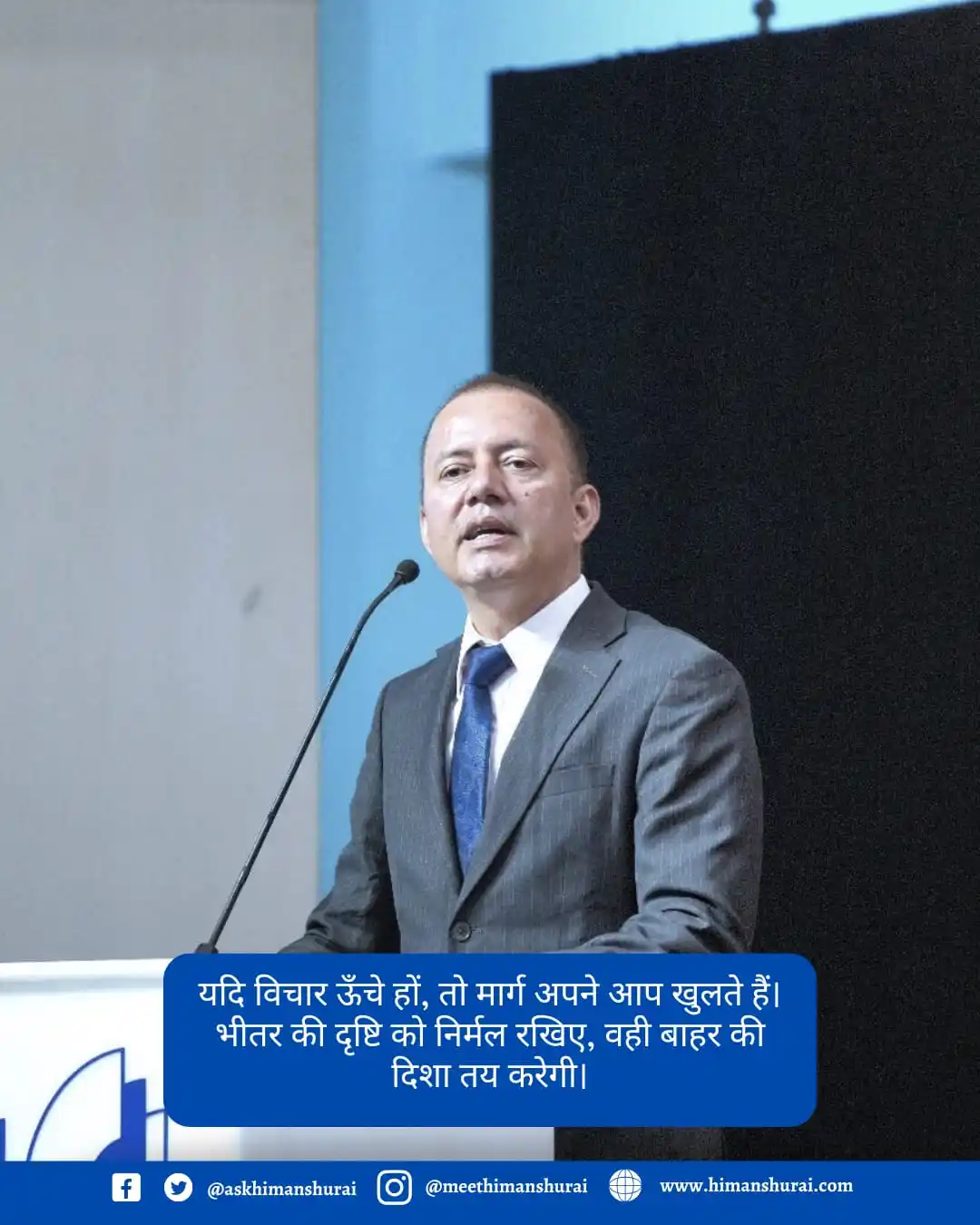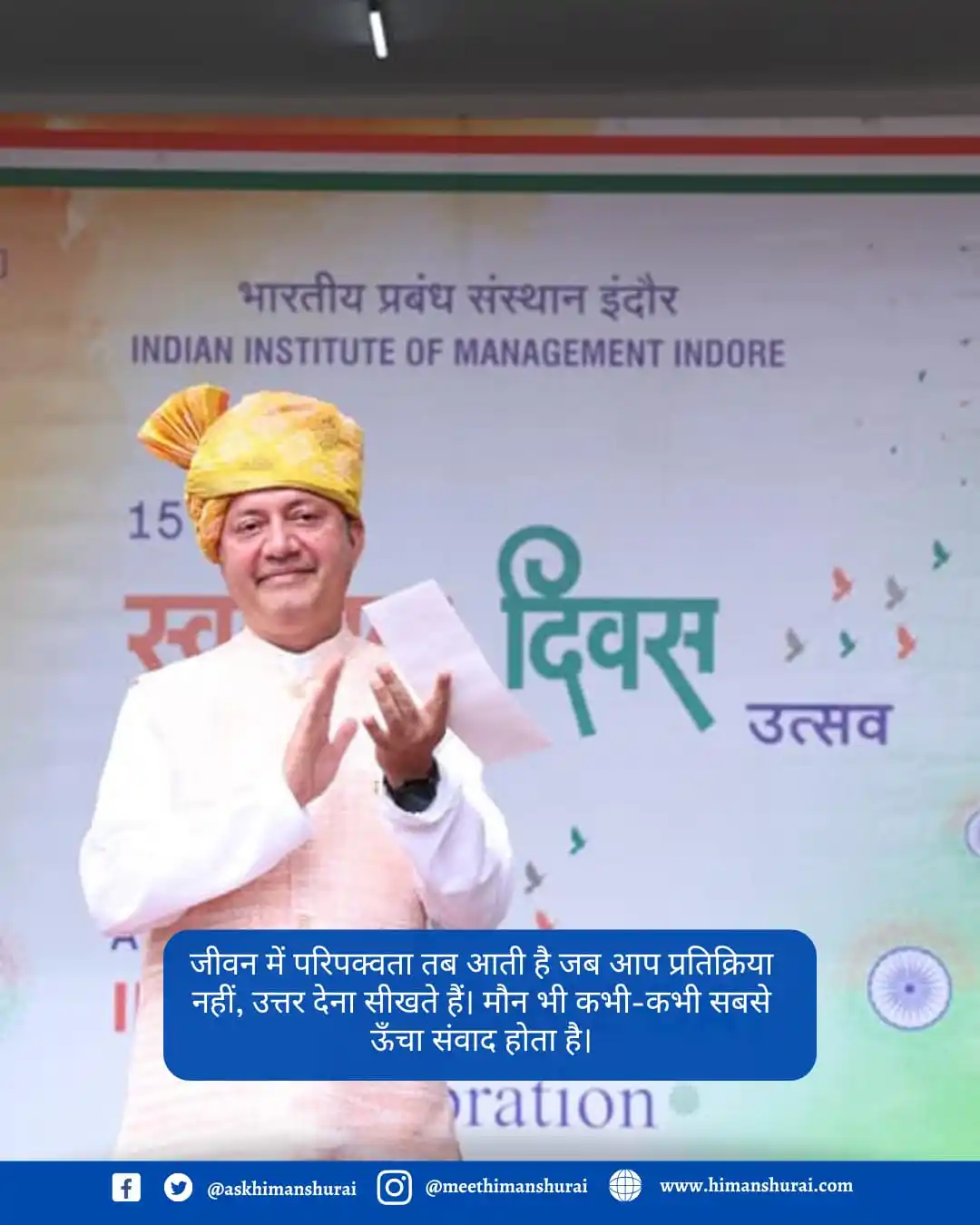
Himanshu Rai
2.0K subscribers
About Himanshu Rai
Official WhatsApp Channel of Prof. Himanshu Rai, Director, IIM Indore. Teacher | Author | Sanskrit Scholar | Yoga Guru | Mountaineer | Philosopher | Stay Connected: Twitter @askhimanshurai | Instagram: @meethimanshurai आईआईएम इंदौर के निदेशक प्रो. हिमांशु राय का Official WhatsApp Channel शिक्षक | लेखक | संस्कृतज्ञ | योग गुरु | पर्वतारोही | दार्शनिक | जुड़े रहें: Twitter @askhimanshurai | Instagram: @meethimanshurai
Similar Channels
Swipe to see more
Posts

हमारे जीवन में परिवर्तन लगातार होता रहता है। परिस्थितियाँ बदलती हैं, लोग बदलते हैं, और कभी-कभी हमारी योजनाएँ भी बदल जाती हैं। ऐसे में यह जरूरी है कि हम अनुकूलनशील बनें—यानी, हम उन परिवर्तनों के साथ तालमेल बैठाकर उन्हें अपने लाभ में बदल सकें। अनुकूलनशीलता केवल यह नहीं है कि हम बदलते हुए वातावरण के साथ जी सकें, बल्कि यह हमारी आंतरिक क्षमता है कि हम हर स्थिति में अपना सबसे अच्छा प्रदर्शन कर सकें। यह किसी के लिए नए कौशल सीखने की प्रक्रिया हो सकती है, तो किसी के लिए अपनी पुरानी सोच को छोड़कर नई सोच अपनाने का एक तरीका। भगवद गीता में कहा गया है कि जो व्यक्ति समय और परिस्थितियों के अनुसार अपने कर्तव्यों को निभाता है, वह सफलता प्राप्त करता है। यह सिखाता है कि जीवन में बदलावों का सामना करने के लिए हमें लचीला और अनुकूल होना चाहिए, क्योंकि परिस्थितियाँ कभी स्थिर नहीं रहतीं। आज के दिन रुककर सोचिए—क्या आप अपने जीवन के किसी बदलाव को खुलकर अपनाने के लिए तैयार हैं? क्या आप अपनी पुरानी आदतों और सोच को छोड़कर नए तरीके से सोच सकते हैं? अनुकूलनशीलता हमें न केवल बदलती परिस्थितियों से जूझने की ताकत देती है, बल्कि यह हमें आगे बढ़ने, नया सीखने और असल में जीवन के हर बदलाव को अवसर के रूप में देखने की दृष्टि भी प्रदान करती है।

हम अक्सर सोचते हैं कि किसी अच्छे कार्य को करने के लिए बड़ा कदम उठाना चाहिए, लेकिन सच्चाई यह है कि छोटे-छोटे सकारात्मक प्रयास भी जीवन में गहरा असर डाल सकते हैं। जीवन में जब हम कुछ अच्छा करते हैं, चाहे वह कितना भी छोटा क्यों न हो, वह न केवल हमारे आस-पास के वातावरण को बदलता है, बल्कि हमारे मनोबल को भी ऊंचा करता है। "सत्यमेव जयते" – यह प्रसिद्ध संस्कृत वाक्य हमें यह सिखाता है कि सत्य, अच्छाई और ईमानदारी हमेशा विजयी होती है, चाहे उसका रूप कितना भी छोटा या साधारण क्यों न हो। एक छोटा सा मुस्कान, किसी की मदद करना, या किसी के साथ अच्छा व्यवहार करना—ये सब छोटी-छोटी बातें हैं जो किसी के जीवन में सकारात्मक बदलाव ला सकती हैं। उदाहरण के तौर पर, एक दिन किसी ने आपके काम में मदद की या आपकी समस्या को सुना, तो आप उसी तरह दूसरों की मदद करने का मन बनाएंगे। याद रखें, "अच्छा कार्य कभी व्यर्थ नहीं जाता"। जैसे एक छोटे दीपक से अंधेरे कमरे को रोशन किया जा सकता है, वैसे ही एक छोटा सा अच्छा कार्य पूरे समाज में सकारात्मक बदलाव का कारण बन सकता है। आज ही कोई छोटा लेकिन सकारात्मक कार्य करें, और देखिए कि उसका असर आपके जीवन और दूसरों के जीवन पर कैसे होता है।

In the Mahabharata, Karna is a powerful example of kindness, marked by selflessness and compassion despite the circumstances of his life. Born to Kunti before her marriage, he was raised by a charioteer’s family and faced prejudice throughout his life. Despite his struggles, Karna remained loyal, generous, and kind, especially in times of adversity. One of Karna’s most profound acts of kindness occurred before the Kurukshetra war, when he was approached by Lord Indra, disguised as a Brahmin, who asked for Karna’s magical Kavacha and Kundala (armor). Knowing the armor would leave him vulnerable in battle, Karna didn’t hesitate. He gave away his most prized possessions, even though it would eventually lead to his defeat. Karna's kindness was not about expecting anything in return; it was a reflection of his inner strength and values. His loyalty to Duryodhana and his unwavering commitment to help others, despite his own challenges, show that true kindness comes from an unselfish heart. Karna’s story teaches us that kindness isn’t about rewards or recognition—it’s about doing what’s right, even when it costs us dearly. Think about one small act of kindness you can offer today, without expecting anything in return. How can you bring this strength of character into your own life?

You know, self-talk is an invisible force shaping your daily reality. It’s the narrative you tell yourself when things go wrong, or right. And whether you realize it or not, that inner dialogue is more powerful than any external criticism or praise. Positive self-talk is motivational; but it’s also belief. Research shows that athletes who engage in positive self-talk perform better than those who don’t. This also applies to leaders, employees, and anyone who faces challenges. The right words can rewire your brain for success. Next time you face a difficult task, observe your internal dialogue. Is it filled with doubt, or does it affirm your ability to solve the problem? The difference is subtle, but profound. Practice replacing "I can't" with "I haven't yet." You are the sum of your thoughts. Make them work in your favor.

Have you ever felt like you’re not good enough? That somehow, you're just "faking it," and others will eventually find out? If so, you're not alone. This feeling is known as imposter syndrome, and it affects high achievers across industries. The truth is, everyone experiences self-doubt. It’s not a sign of incompetence; it’s a sign of growth. The fact that you’re challenging yourself means you’re entering uncharted territory. And that’s uncomfortable. But it’s also where the best learning happens. Instead of letting imposter syndrome hold you back, use it as a cue to step up. Acknowledge the discomfort and move through it. Own your accomplishments, but also accept that growth comes with growing pains. The next time you feel like an imposter, remind yourself: the very fact that you’re feeling this way means you’re pushing boundaries. Keep going.



















